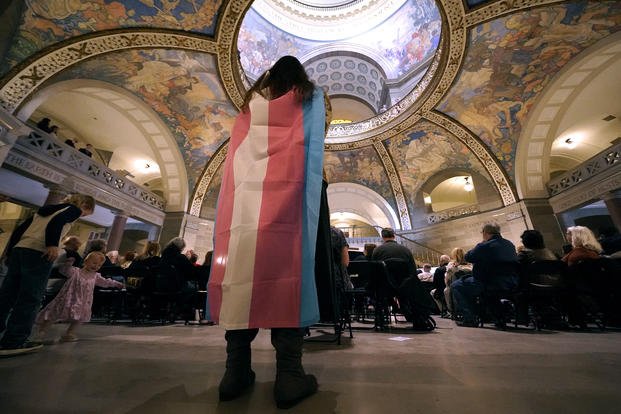
Rebecca Kheel | Military
Two years after the Department of Veterans Affairs said it would cover gender-affirmation surgery for transgender veterans, the department now says it has no timeline for when the procedures will actually be offered.
Uncertainty on when the department may follow through on a high-profile announcement in June 2021 that it would provide the health care comes as the issues of LGBT rights have been thrust again into the national spotlight and become political lightning rods. The VA originally said the process to implement the policy would take about two years.
Anti-transgender sentiment is on the rise among the political right, with hundreds of bills being introduced in state legislatures this year aimed at rolling back transgender rights. In recent days, the VA has been criticized by lawmakers for flying Pride Month flags. Republicans in Congress have also increasingly attacked the Biden administration’s efforts to support LGBT service members and veterans.
The VA denied that the delay is related to the growing anti-trans movement, saying it is taking its time to craft the policy carefully and thoroughly.
“There are several steps to take, which will take time,” VA press secretary Terrence Hayes said in a statement to Military.com. “But we are moving ahead, methodically, because we want this important change in policy to be implemented in a manner that has been thoroughly considered to ensure that the services made available to veterans meet VA’s rigorous standards for quality health care.”
Hayes declined to say what step in the process the policy is in right now and what steps are left.
VA Secretary Denis McDonough announced the department would cover gender-affirmation surgeries during a 2021 Pride Month event in Orlando, Florida, marking the fifth anniversary of the mass shooting at the gay nightclub Pulse.
“We’re making these changes not only because they are the right thing to do, but because they can save lives,” McDonough said then.
The announcement was part of a flurry of moves in the early days of the Biden administration to demonstrate its support for the LGBT community, including lifting a ban on transgender troops serving openly.
But McDonough’s announcement did not herald an immediate change in VA coverage. Rather, it kicked off a formal rulemaking process, in which a proposed rule is published in the Federal Register and public comment is solicited, among other steps.
The length of the federal rulemaking process can vary widely, with some rules taking months to finalize and others taking a decade. But the VA told Military.com in 2021 that it expected the process for the rule on gender-affirmation surgeries to take about two years.
Even the two-year timeline was frustratingly slow for transgender veterans, who argued the department could speed up the process by relying on work done in 2016 when the Obama administration considered covering surgical procedures. Speed is a matter of life and death, they added, because studies show access to gender-affirming care reduces the risk of suicide among transgender people.
“I cannot emphasize this enough: This care will save veterans’ lives,” Rep. Julia Brownley, D-Calif., said at a March news conference urging the VA to act faster to cover surgery for transgender veterans. “Time is of the essence.”
The VA covers other gender-affirming care, including hormone therapy, mental health care, pre- and post-operative care, voice coaching and medically necessary prosthetics. But surgery itself is explicitly banned from coverage.
While the VA denies the delay on surgery coverage is related to Republican criticism, it comes as the Biden administration has appeared to acquiesce to GOP outrage on other LGBT issues.
After months of being yelled at by Republicans over drag shows being hosted on military bases, Defense Secretary Lloyd Austin last week started enforcing a ban on on-base drag shows, which have happened on military installations at least as far back as World War II.
Republicans also started directing their ire at VA facilities flying pride flags this month, though the department responded by defending the practice as “a symbol of VA’s commitment to inclusion and as a tribute to the service and sacrifice of LGBTQ+ veterans, their families, caregivers and survivors.”
Republicans, in a letter this week to McDonough, suggested the Pride Flags represented “discrimination and political posturing.”
Despite the equivocation on some issues, the Biden administration has been touting its support for the LGBT community and criticizing anti-LGBT laws during Pride Month, the annual celebration in June to mark the anniversary of the 1969 Stonewall Uprising that is considered the start of the modern LGBT rights movement.
“As president, I was proud to end the ban on transgender troops in our military, sign the Respect for Marriage Act, strengthen the civil rights protections for LBGT Americans and advance LGBT human rights around the globe,” President Joe Biden said Thursday. “But our fight is far, far from over because we have some hysterical and, I would argue, prejudiced people who are engaged in all of what you see going on around the country.”
The VA in its statement insisted it has a “full understanding” of the “importance and urgency” in covering surgery for transgender veterans.
“It’s our mission at VA to provide transgender veterans — and all veterans — with the world-class care and benefits they deserve,” Hayes said. “We thank each and every one of these heroes for their service and sacrifice, and we will continue to work to earn their trust, day by day, through our efforts and our actions.”
This story was originally published by the Military.com on June 9, 2023.
Issues: 118th Congress, Healthcare, Veterans' Affairs